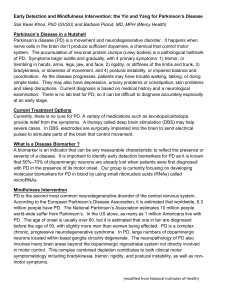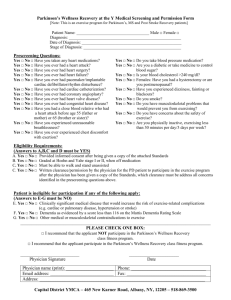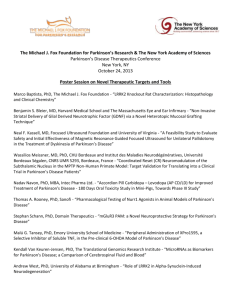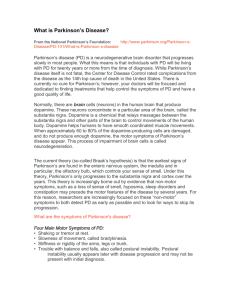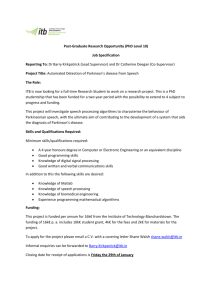OPDC Biosample and Clinical Data Application form
advertisement
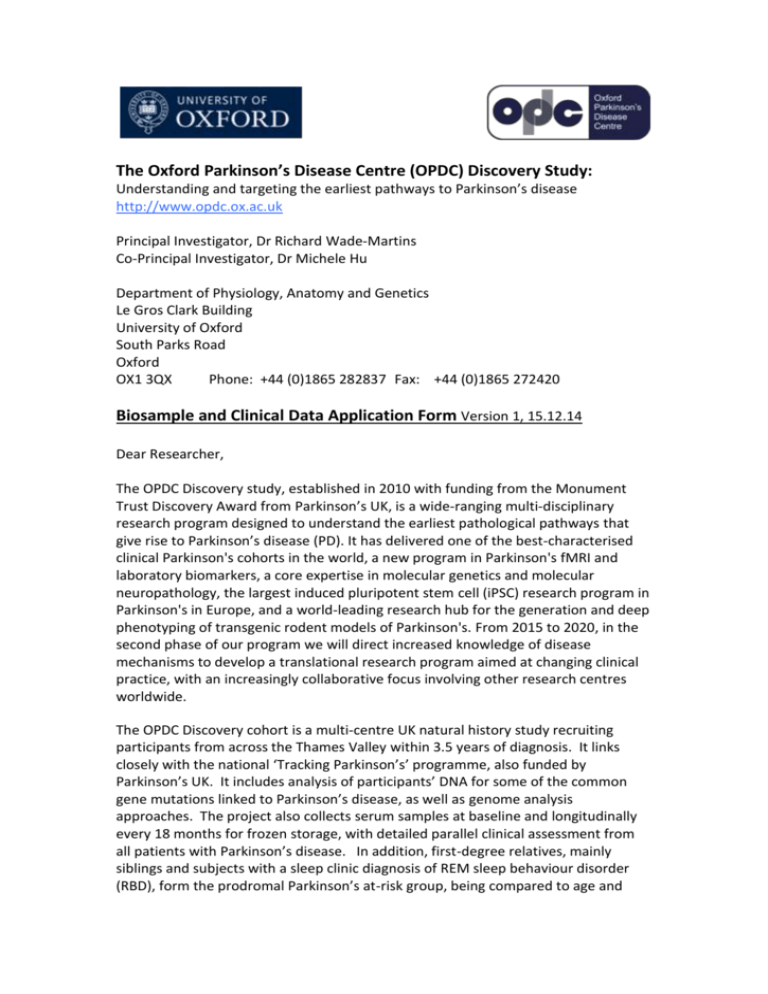
The Oxford Parkinson’s Disease Centre (OPDC) Discovery Study: Understanding and targeting the earliest pathways to Parkinson’s disease http://www.opdc.ox.ac.uk Principal Investigator, Dr Richard Wade-Martins Co-Principal Investigator, Dr Michele Hu Department of Physiology, Anatomy and Genetics Le Gros Clark Building University of Oxford South Parks Road Oxford OX1 3QX Phone: +44 (0)1865 282837 Fax: +44 (0)1865 272420 Biosample and Clinical Data Application Form Version 1, 15.12.14 Dear Researcher, The OPDC Discovery study, established in 2010 with funding from the Monument Trust Discovery Award from Parkinson’s UK, is a wide-ranging multi-disciplinary research program designed to understand the earliest pathological pathways that give rise to Parkinson’s disease (PD). It has delivered one of the best-characterised clinical Parkinson's cohorts in the world, a new program in Parkinson's fMRI and laboratory biomarkers, a core expertise in molecular genetics and molecular neuropathology, the largest induced pluripotent stem cell (iPSC) research program in Parkinson's in Europe, and a world-leading research hub for the generation and deep phenotyping of transgenic rodent models of Parkinson's. From 2015 to 2020, in the second phase of our program we will direct increased knowledge of disease mechanisms to develop a translational research program aimed at changing clinical practice, with an increasingly collaborative focus involving other research centres worldwide. The OPDC Discovery cohort is a multi-centre UK natural history study recruiting participants from across the Thames Valley within 3.5 years of diagnosis. It links closely with the national ‘Tracking Parkinson’s’ programme, also funded by Parkinson’s UK. It includes analysis of participants’ DNA for some of the common gene mutations linked to Parkinson’s disease, as well as genome analysis approaches. The project also collects serum samples at baseline and longitudinally every 18 months for frozen storage, with detailed parallel clinical assessment from all patients with Parkinson’s disease. In addition, first-degree relatives, mainly siblings and subjects with a sleep clinic diagnosis of REM sleep behaviour disorder (RBD), form the prodromal Parkinson’s at-risk group, being compared to age and gender matched control subjects at baseline and longitudinal visits. Baseline and longitudinal MRI brain scans (including structural and functional sequences acquired at 3.0 T) are being collected in a subgroup of control, PD, PD relative and RBD subjects at FMRIB (Functional MRI of the Brain: http://www.fmrib.ox.ac.uk). The DNA specimens, serum and skin samples are stored in the Nuffield Department of Clinical Neurosciences at the University of Oxford, with the reprogramming of selected skin fibroblasts to induced pluripotent stem cells (iPSc lines) at the Oxford Stem Cell Facility. The DNA and frozen biosamples are a valuable resource for scientists investigating the pathogenesis of Parkinson’s disease and related neurodegenerative disorders. The OPDC clinical consortium is happy to make this material available to support selected external research projects, although recognises that the supply of material is limited. In particular, samples from baseline visits, which are an irreplaceable and precious resource, will require close scrutiny by the Data Access Committee. The processes in place are similar to those operated by the Parkinson’s UK Brain Bank held at Imperial College London. Following successful application, the biosample and clinical data will be released pending an individuallynegotiated Material Transfer Agreement (MTA) or Data Transfer Agreement (DTA) between the relevant parties. If work performed on the material supplied by OPDC is likely to generate future ideas, rights, processes or products of potential commercial value, the Institution where we are based will prospectively enter into a separate agreement between the external collaborating institution, Parkinson’s UK, and the University of Oxford on all relevant intellectual property arising. The OPDC clinical consortium is based on a highly collaborative research approach whereby biomaterials and clinical data are made available to interested parties on successful application as part of a two-way process of engagement between the OPDC and interested parties. This approach is in contrast to a general Biobank approach, where biosamples and clinical data are released via an open access approach without the need for active collaboration. Therefore, to maintain and improve the programme of research, it is a normally a condition of receiving data and/or samples that you will return information such as results of assays, gene test studies, and similar, and the methods for obtaining derived variables such as with the clinical dataset, to the OPDC clinical consortium; except in the case where iPSc lines are deposited in a dedicated iPSc bank. This would generally be undertaken once the investigation is complete at the stage prior to publication of relevant results. To initiate the application procedure please complete the request form and send it to us If you have any further queries or want to discuss your requirements prior to filling out this form, please contact the Chief Investigators for the OPDC– Dr Richard Wade-Martins (email richard.wade-martins@dpag.ox.ac.uk) and Dr Michele Hu (email michele.hu@ndcn.ox.ac.uk). 1 Contact and Project Details Study PI Name: Position: Address: Phone: Facsimile: E-mail: Date requested: Date needed: Project Title: Source of funding*: Starting date: Duration: *If this is not part of a peer reviewed grant application, please provide evidence of institutional support and/or peer review. Additional co-investigators/ collaborators (both inside and outside of the PI’s primary institution: Lay summary (maximum 150 words): Scientific justification: Please provide the necessary background, aims, justification for the type of sample or clinical/imaging information requested, sample size, analytical methods and number of cases requested from, techniques to be used, result of pilot studies (including relevant publications) and expected benefits to Parkinson’s disease research. This will be used to assess the value of the work against sample availability and is limited to 600 words maximum. 2 Details of sample/clinical data requirement A. DNA Samples Please describe proposed methods B. Frozen Serum Samples The frozen serum samples are generally stored as 4-5 x 500 l aliquots per patient visit; the samples are stored at -80oC. Please describe the proposed usage and the volume of serum required for your project, which participant visit you require samples from and why (baseline, 18, 36, 54 months) and the number of times samples would be subjected to thawing and re-freezing. C. Clinical and imaging data A large amount of clinical anonymised information to assess motor, non-motor and cognitive function is currently collected at baseline in all control, PD, PD relative and RBD subjects at baseline. The same information is also collected in all PD, PD relative and RBD subjects at longitudinal 18 monthly visits. A full list of our current protocol can be viewed on our website (http://opdc.medsci.ox.ac.uk). Baseline and longitudinal MRI brain scans (including structural and functional sequences acquired at 3.0 T) are being collected in a subgroup of control, PD, PD relative and RBD subjects at FMRIB (Functional MRI of the Brain: http://www.fmrib.ox.ac.uk). No. of participants PD Diagnosis < 3.5 years Baseline DNA Frozen serumspecify which visit (eg baseline, 18, 36, 54 months etc) Clinical data- specify which rating scales/data and which visit (eg baseline, 18, 36, 54 months etc) MRI brain scansspecify which sequences and which visit (eg baseline, 3 years) Controls PD Relatives RBD subjects Signature of Principle applicant Signed ------------------------------------------------Name Date Signature of an authorised representative on behalf of the Principal applicant’s Institution Signed -------------------------------------------------Name Position Date Signature of an authorised representative on behalf of the Host Institution (Oxford University) Signed -------------------------------------------------Name Position Date Funded by Parkinson’s UK. Parkinson’s UK is the operating name of the Parkinson’s Disease Society of the United Kingdom. A company registered in England and Wales (948776). Registered Office 215 Vauxhall Bridge Road, London SW1V 1EJ. A charity register in England and Wales (258197) and in Scotland (SC037554).
